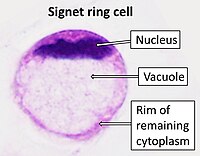
Photo from wikipedia
Class I phosphoinositide 3‐kinase (PI3K) signaling is a major pathway in human cancer development and progression. Among the four PI3K isoforms, PI3Kα and PI3Kβ are ubiquitously expressed, whereas PI3Kγ and… Click to show full abstract
Class I phosphoinositide 3‐kinase (PI3K) signaling is a major pathway in human cancer development and progression. Among the four PI3K isoforms, PI3Kα and PI3Kβ are ubiquitously expressed, whereas PI3Kγ and PI3Kδ are found primarily in leukocytes. Until now, PI3K targeting in solid tumors has focused on inhibiting PI3Kα‐mediated and PI3Kβ‐mediated cancer cell–intrinsic PI3K activity. The role of PI3Kδ in solid tumors is unknown. Here, we evaluated the effects of PI3Kδ using established hepatocellular carcinoma (HCC) cells, malignant hepatocytes derived from patients with advanced HCC, murine models, and HCC tissues using RNA sequencing, quantitative PCR, immunoblotting, immunofluorescence, microarray, liquid chromatography–tandem mass spectrometry, and kinase assay. We established a chemical carcinogenesis model of liver malignancy that reflects the malignant phenotype and the in vivo environment of advanced HCC. In this in vivo advanced HCC‐mimic system using HCC cells treated with hydrogen peroxide (H2O2), we showed that H2O2 selectively increases PI3Kδ activity while decreasing that of other class I PI3Ks. Blocking PI3Kδ activity with a PI3Kδ inhibitor or small interfering RNA–mediated PI3Kδ gene silencing inhibited HCC‐cell proliferation and dampened key features of malignant HCC, including the up‐regulation of telomerase reverse transcriptase (TERT). Mechanistically, H2O2 induced oxidative modification of the serpin peptidase inhibitor, serpin peptidase inhibitor (SERPINA3), blocking its ubiquitin‐dependent degradation and enhancing its activity as a transcriptional activator of PI3Kδ and TERT. High PI3Kδ levels in HCC were found to correlate with poor survival rates, with human advanced HCC showing positive correlations between the protein levels of oxidized SERPINA3, PI3Kδ, and TERT. Thus, PI3Kδ plays significant roles in malignant liver tumors. Conclusion: Our data identify PI3Kδ inhibition, recently approved for the treatment of human B‐cell malignancies, as a potential treatment for HCC.
Journal Title: Hepatology
Year Published: 2018
Link to full text (if available)
Share on Social Media: Sign Up to like & get
recommendations!